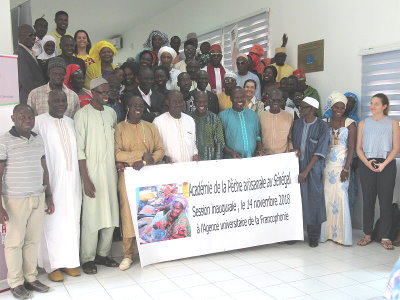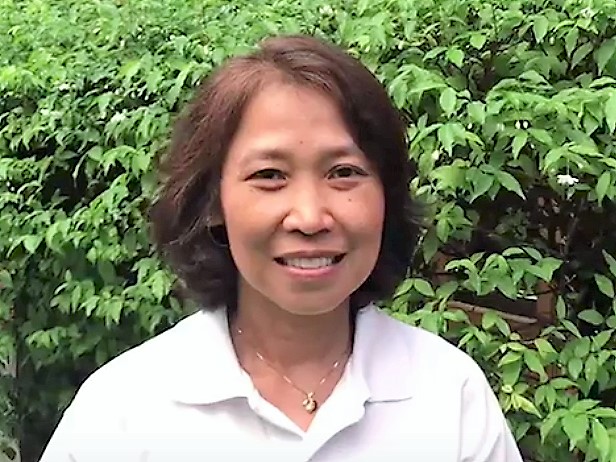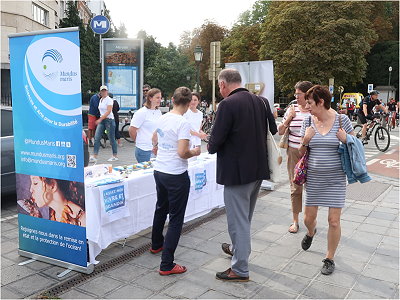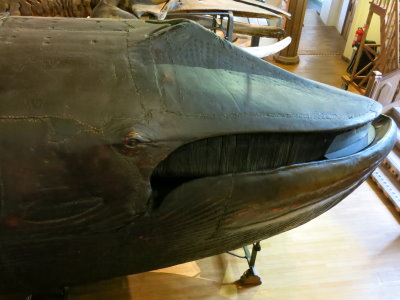
Picture of the month
 The highlight of the month of November was the launch of the Small-Scale Fisheries Academy in Senegal. Supported by a multi-stakeholder organising committee formed upon the suggestion of Mundus maris the inaugural session was kindly hosted by the Agence Universitaire de la Francophonie (AUF) on the campus of Cheikh Anta Diop University in Dakar on 14 November 2018. Some 62 personalities from different walks of life met in intense exchange and debates for a full day.
The highlight of the month of November was the launch of the Small-Scale Fisheries Academy in Senegal. Supported by a multi-stakeholder organising committee formed upon the suggestion of Mundus maris the inaugural session was kindly hosted by the Agence Universitaire de la Francophonie (AUF) on the campus of Cheikh Anta Diop University in Dakar on 14 November 2018. Some 62 personalities from different walks of life met in intense exchange and debates for a full day.
 More than 350 participants from 55 countries made the 3rd World Small-Scale Fisheries Congress in Chiang Mai, Thailand, the biggest of its kind. Dr. Ratana Chuenpagdee, Project Director of the global research collaboration "Too Big To Ignore" headquartered in Canada welcomed participants (click on the picture to see the video).
More than 350 participants from 55 countries made the 3rd World Small-Scale Fisheries Congress in Chiang Mai, Thailand, the biggest of its kind. Dr. Ratana Chuenpagdee, Project Director of the global research collaboration "Too Big To Ignore" headquartered in Canada welcomed participants (click on the picture to see the video).
 The Sunday without cars is a fixed appointment in Brussel's agenda and much loved by the inhabitants who take to the street in droves on byke, roller scates and foot. The Mundus maris team had a great field day talking to a cross-section of people about how to reduce the acidification of the ocean from excess traffic using fossil fuels and other opportunities to connect more sustainably to the one Blue Planet we have. Lots of people suggested that cars should be banned at least once a month, not only once per year. Is the administration hearing the message of the citizens?
The Sunday without cars is a fixed appointment in Brussel's agenda and much loved by the inhabitants who take to the street in droves on byke, roller scates and foot. The Mundus maris team had a great field day talking to a cross-section of people about how to reduce the acidification of the ocean from excess traffic using fossil fuels and other opportunities to connect more sustainably to the one Blue Planet we have. Lots of people suggested that cars should be banned at least once a month, not only once per year. Is the administration hearing the message of the citizens?
 The Natural History Museum up on a hill in Gothenburg, only a stone throw away from the Linné university campus is a place not to miss if you want to see what's been dubbed the "Malm Whale", a young Blue Whale male, the only whale stuffed on display in the world. Stranded on October 29th, 1865, in the Askim Bay near Gothenburg,
The Natural History Museum up on a hill in Gothenburg, only a stone throw away from the Linné university campus is a place not to miss if you want to see what's been dubbed the "Malm Whale", a young Blue Whale male, the only whale stuffed on display in the world. Stranded on October 29th, 1865, in the Askim Bay near Gothenburg,
 "Red fishes" is a collection of paintings guided by the artist Massoud Lari in the Ateliers Créatifs du Chant d'Oiseau, Brussels, Belgium.
"Red fishes" is a collection of paintings guided by the artist Massoud Lari in the Ateliers Créatifs du Chant d'Oiseau, Brussels, Belgium.
This collective work brought together more than 50 painters interested in the marine world. The red colour vibrates in all works, providing a metaphorical meaning for the World Oceans Day 2018.
 The preparations for World Oceans Day in Kribi, on the coast of Cameroon
The preparations for World Oceans Day in Kribi, on the coast of Cameroon
Our partners in Cameroon, Bénévoles de l'Océan (Volunteers for the Ocean), have worked tirelessly to engage as many young people as possible with celebrating World Oceans Day. The central themes chosen by the United Nations for this year is protecting the ocean from plastic pollution and thus promote healthy living conditions for humans as well. In the primary school, Ecole primare d'application in Kribi Centre "Ocean", they met open doors.
 The women in the fishery in Hann have organised an impressive Labour Day celebration, May 1, 2018.
The women in the fishery in Hann have organised an impressive Labour Day celebration, May 1, 2018.
Large crowds participated in the May 1 event called by the PARASE Economic Interest Group. Some 500 women joined the gathering in response to the call. Speakers took stock of the situation, especially of the fish cleaning women, who are among the most vulnerable female workers. There were also authorities at the gathering to be told to finally recognise the artisanal fishery at its fair value, including the role of women.
 The almost 200 dancers of the Ballet and Jazz Departments of TSV Reinbek and the Flamenco School Costa Cabral presented a versatile programme around the essence of life in the Sachsenwald Forum Reinbek, near Hamburg. In addition to the impressive staging of the beauty of nature, including its diverse flora and fauna, the project had a special, socially critical focus. It aimed at mediating a broad awareness for much needed environmental protection.
The almost 200 dancers of the Ballet and Jazz Departments of TSV Reinbek and the Flamenco School Costa Cabral presented a versatile programme around the essence of life in the Sachsenwald Forum Reinbek, near Hamburg. In addition to the impressive staging of the beauty of nature, including its diverse flora and fauna, the project had a special, socially critical focus. It aimed at mediating a broad awareness for much needed environmental protection.
 The competition of the festival "Pêcheurs du monde" (Fishers of the world), will be opened on Thursday, March 22, 2018, in Lorient by the projection of a Senegalese film of Thomas Grand and Moussa Diop "Poisson d'or, poisson africain" (Fish of gold, African fish). The documentary makes us experience an exceptional dive into the complexity, the richness and the tough conditions of artisanal fishing in Casamance. Thousands of people from all over West Africa converge on this coast at the limit of the large sardinella schools moving south from the coastal waters of Morocco to Senegal.
The competition of the festival "Pêcheurs du monde" (Fishers of the world), will be opened on Thursday, March 22, 2018, in Lorient by the projection of a Senegalese film of Thomas Grand and Moussa Diop "Poisson d'or, poisson africain" (Fish of gold, African fish). The documentary makes us experience an exceptional dive into the complexity, the richness and the tough conditions of artisanal fishing in Casamance. Thousands of people from all over West Africa converge on this coast at the limit of the large sardinella schools moving south from the coastal waters of Morocco to Senegal.
 Our partners in Cameroon, Bénévoles des Océans, showed their ability to innovate by constructing seats from recycled plastic bottles recovered last year from a riverbed in Douala - from a river that changed its bed because its course was clogged by impressive amounts of rubbish, particularly plastic.
Our partners in Cameroon, Bénévoles des Océans, showed their ability to innovate by constructing seats from recycled plastic bottles recovered last year from a riverbed in Douala - from a river that changed its bed because its course was clogged by impressive amounts of rubbish, particularly plastic.
 On 12 January 2018, Oceana Philippines, represented by its Vice President Atty. Gloria E. Ramos, convened a conference on “Law Enforcement and Science: Restoring Filipino Fisheries” in Quezon City, Metro Manila, that featured world renowned fisheries scientist, Prof. Daniel Pauly, among other speakers. "Overfishing destroys ecosystems and erodes food security," explained Prof. Pauly at the event.
On 12 January 2018, Oceana Philippines, represented by its Vice President Atty. Gloria E. Ramos, convened a conference on “Law Enforcement and Science: Restoring Filipino Fisheries” in Quezon City, Metro Manila, that featured world renowned fisheries scientist, Prof. Daniel Pauly, among other speakers. "Overfishing destroys ecosystems and erodes food security," explained Prof. Pauly at the event.
 Women in artisanal fishing: Interview with Ms. Ramatoulaye Barry, leader of a group of female fishmongers in Conakry.
Women in artisanal fishing: Interview with Ms. Ramatoulaye Barry, leader of a group of female fishmongers in Conakry.
What are the assessments of women in fishing about the impact of globalisation and their prospects of a better tomorrow? This is the first in a series of interviews Mundus maris intends to conduct with women, consistent with the importance it attributes to the gender dimension in its agenda. Whenever the opportunity arises, we want to hear from the women involved in the exploitation and along the value chains of the sector.
25,000 march for the climate in Bonn before COP23.
Bonn, 4 November 2017. Called upon by numerous environmental and political organisations, some 25,000 people of all age groups came to march for the speedy implementation of the Paris Climate Agreement of 2015. The dominant focus was on stopping coal NOW and leaving oil in the ground.
 documenta 14 closed its doors in Kassel on 17 September 2017. In memoriam of Beau Dick, Hereditary Chief of the Kwakwaka'wakw First Nation in British Columbia on Canada's West Coast, we show this mask of his series "Undersea Kingdom".
documenta 14 closed its doors in Kassel on 17 September 2017. In memoriam of Beau Dick, Hereditary Chief of the Kwakwaka'wakw First Nation in British Columbia on Canada's West Coast, we show this mask of his series "Undersea Kingdom".
Beau Dick’s name in the Kwakw’ala language means “big, great whale.”








